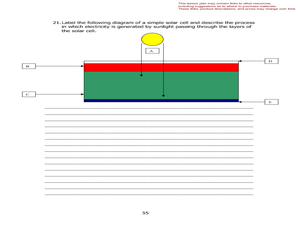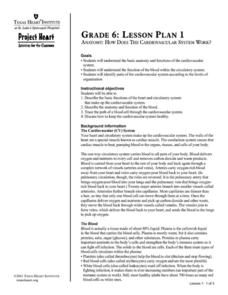Curated OER
Homeostasis and Cell Transport
In this homeostasis worksheet, students complete a crossword puzzle with 22 question on homeostasis and cell transport. They identify the different ways substances are transported in and out of the cell.
Curated OER
Analyzing Advertising
Some ads really make products look great, and even better than they really are! Kids get into small groups to research and compare marketing used by various cell phone companies. They analyze advertisements, carrier options, and cell...
Curated OER
Raven Chapter 12 Guided Notes: Sexual Reproduction & Meiosis
Young biologists define reproduction vocabulary terms, answer critical-thinking questions, label a diagram of the human life cycle, and complete a chart comparing mitosis to meiosis. This is a well-balanced worksheet. Even though it...
Virginia Department of Education
Photosynthesis and Cellular Respiration
Provide high schoolers with their own indoor gardens! Emerging scientists discuss the process of photosynthesis and germinate seeds before growing plants in multiple lighting conditions. The hands-on application allows pupils to see...
Curated OER
Apoptosis: Programmed Cell Death During Development
Students model the plasticity of neural pathways for memory in the brain. They simulate the cell activity according to dots on cards that they are given. They complete various simulations of different cell combinations.
Curated OER
Product Design and Production in the Global Economy
Eleventh graders explore the design, manufacture and consumption of personal audio devices and cellular products. They examine the related issues, choices, and consequences in the global economy for such purchases. They research...
Curated OER
There are Microbes in my Food!
Sixth graders produce yogurt in the classroom as an example of the use of microbes in food production, and record observations in science journals.
Curated OER
The Virtual Electron Microscope
Students explore the world of the very small using a Flash plug-in Virtual Electron Microscope. They complete and discuss an activity in which unknown samples are placed under the computer simulated microscope to determine where the...
Curated OER
Chem 152-Electrochemistry
In this electrochemistry instructional activity, students solve a variety of problems including identifying parts of oxidation and reduction reactions, writing balanced equations for galvanic cells, determining free energy and...
Curated OER
Electron Transport System Made Fun and Easy:
Students identity the components of electron transport system through role play. They explain the role of intermediate energy carriers to the production of ATP molecules. They describe the relationship of electron transport system to...
Curated OER
Standard 4 Review Sheet-Key Ideas Biology-The Living Environment
In this living environment worksheet, high schoolers answer a variety of questions about living organisms, the processes they go through to make food and break down food, absorb nutrients, and release toxins. They explain homeostasis,...
Curated OER
A Pox No Longer Upon Us
Tenth graders research the development and use of vaccines. They examine historical documents for qualitative observations and the basis of immunization. They examine primary and secondary immune responses as they relate to the...
Curated OER
Photovoltaics and Solar Energy
Students experiment with photovoltaic cells and determine the energy use of their appliances. In this renewable energy lesson plan, students calculate the energy emitted by a photovoltaic cell through an inquiry-based lab. They keep...
K12 Reader
Tissues, Organs and Systems
Young scientists are introduced to the connections among cells, tissues, organs, and systems in a life science reading comprehension worksheet that asks them to respond to a series of questions based on the passage.
Howard Hughes Medical Institute
Viral DNA Integration
How do viruses hijack our cells to produce more viral particles? Junior immunologists model how viral RNA integrates into a host cell's DNA using pop beads and use interactive tools to explore a virus' genome. The teacher's guide...
Nuffield Foundation
Microscale Investigations of Catalase Activity in Plant Extracts
Use indirect measurements to monitor metabolic activity in plant cells. Scholars understand that cells with a higher metabolic rate have a higher concentration of catalase enzyme. They use this information to compare metabolic rates of...
Texas Heart Institute
Anatomy: How Does the Cardiovascular System Work?
How can the circulatory system compare to a city map? Pupils distinguish the "roadways" and "vehicles" of the cardiovascular system, compare the anatomy and function of veins and arteries, and review different types of blood cells with...
Cornell University
Bacteria Take Over and Down
Bacteria outnumber all other forms of life on Earth. Scholars observe the growth of bacteria in petri dishes to understand their role in maintaining good health. Then, they observe the growth of bacteria after they introduce...
Curated OER
Control of the Cell Cycle
In this cell cycle worksheet, students review how enzymes control the cell cycle and what happens when the cell cycle becomes uncontrolled. This worksheet has 7 short answer questions.
Curated OER
How to: Build a Plant Cell
Students build a 3-dimensional model of a plant cell with household objects. In this plant biology lesson, students construct replica plant cells in groups of three. After completing their projects, students share their creations with...
Curated OER
ATP PRODUCTION
Students study four different types of ATP production and the important role it plays in normal everyday production, where ATP is formed. They will explore the role, functions and conditions that ATP is produced.
Curated OER
2000 U.S. National Chemistry Olympiad National Exam - Part I
The National Chemistry Olympiad exams are comprehensive tests covering an entire year of chemistry concepts. You can use them as practice for competing in the challenge, or simply as a review, or as an actual final exam for your general...
Curated OER
Cell Structure and DNA
Sixth graders identify, locate and describe the function of the parts of a cell. In groups, they state the five stages of mitosis and put them in the correct order. They are introduced to the structure of DNA and mRNA and how they...
Teach Engineering
Copycat Engineers
It's often said that imitation is the sincerest form of flattery. Young engineers learn about biomimicry, which uses nature to generate engineering ideas, in the fifth lesson of nine in a Life Science unit. Working in groups, they select...

























